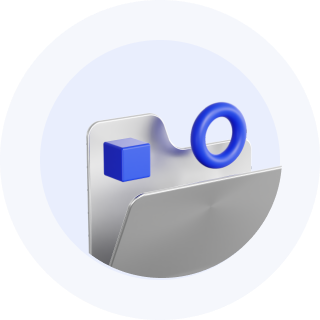
Contact us
Our team would love to hear from you.

Medical coding is the process of converting health information, such as diagnoses and procedures, into universal codes. These codes are essential for medical billing and reimbursement, tracking patient care, maintaining comprehensive records, analyzing healthcare data, research, policymaking, and a wide range of other healthcare operations.
However, errors are an inevitable part of medical coding, resulting from factors such as process complexity, inconsistent documentation, staff shortages, and limited reliance on AI tools (which decreased from 62% in 2022 to 31% in 2024). Advanced technology can significantly improve medical coding, increasing its accuracy and speed and reducing revenue losses.
There are several cases where AI makes medical coding smarter and more reliable.

“AI is redefining medical coding, turning it from a time-consuming task into a streamlined, intelligent process. With our expertise, we help healthcare organizations harness this technology to improve accuracy, reduce costs, and ease the burden on medical staff, allowing them to focus on what matters most: quality patient care.”
Account Manager
AI is more than technology—it’s a game-changer for medical coding solutions. Here’s how it influences the entire RCM.
| Traditional medical coding | AI medical coding | |
|---|---|---|
| Process | Manual review by coders | Coding assistance, suggestions, etc. |
| Speed | Slow process that depends on human effort | Fast process enabled by automating manual tasks |
| Accuracy | Variable, risk of human error | High accuracy and consistency, improves with learning |
| Cost | High staffing and operational costs | Low long-term costs, though setup costs can be high |
| Scalability | Limited | Easily scalable |
| Compliance | Prone to compliance issues due to manual updates and guideline misinterpretation | Easy to maintain compliance with built-in rules and automated update checks |
| Best at | Handling complex tasks | Large-scale routine coding |
How does AI in medical coding work? AI subsets and complementary technologies perform different functions in this process to achieve efficiency and accuracy.
NLP algorithms are used to understand and interpret human language. This technology extracts relevant information from unstructured medical records and analyzes it to identify diagnoses, procedures, and medications, and map them to standardized medical codes.
Machine learning (ML) algorithms identify coding patterns in historical data to predict and verify the most likely codes, while generative AI (GenAI) can interpret unstructured clinical notes and suggest relevant codes. These technologies reduce human error, streamline the coding process, detect fraud in billing and claims data, and predict denials, helping healthcare organizations handle them in advance.
This AI subset is used for scanned medical records. Computer vision algorithms extract text from scanned medical documents and convert it into machine readable text for further NLP processing.
Combined with AI, robotic process automation (RPA) increases automation coverage, reducing manual data entry and handling rule-based coding tasks. RPA bots can confirm that all required fields are filled before submission, reducing denials and aiding claim denial analysis. While AI functions as the “brain,” perceiving context and meaning, RPA is the “hands,” executing tasks and moving data.
Before integrating AI into the medical billing and coding processes, it’s important to understand the complexities that come with it and be prepared to tackle them. Following are some of the most common challenges of AI implementation.
The use of AI in healthcare is subject to specific laws and compliance requirements, such as the EU AI Act, GDPR, HIPAA, and the HITECH Act, which ensure patient safety, data privacy, and ethical feasibility. Having a comprehensive checklist for medical coding software and adherence to best practices can help avoid any legal issues and ensure compliance.
In the healthcare industry, data is unstructured and usually scattered across different systems, such as electronic health records (EHRs) and billing, leading to incorrect or missing codes. Data preprocessing, standardization, and cleaning can mitigate this issue, with human-in-the-loop and continuous AI model monitoring increasing the quality of outputs.
AI systems in medical coding often struggle with accuracy, especially when handling rare or highly complex cases. If unusual diagnoses or procedures are underrepresented in historical data, the system has limited exposure to them, leading to inaccurate coding suggestions. Ensuring accuracy requires large, high-quality datasets and continuous updates.
Many healthcare organizations still rely on legacy systems that lack the capabilities necessary for smooth AI integration. This process can also interrupt established workflows if not implemented carefully. By working closely with a skilled AI team, healthcare organizations can overcome interoperability issues, achieve seamless workflow alignment, and meet their customization needs.
Each medical specialty uses different coding sets, with some more complex and detailed than others. Documenting a patient encounter also varies greatly across specialties and providers. To ensure accurate outcomes, medical coding systems require specialty-specific NLP algorithms and model training and fine-tuning.
As an AI medical coding software development company with over 19 years of experience in healthcare technology, we understand the challenges medical organizations face, and tailor our approach to each client’s needs. Here’s an overview of our process:
Our team conducts a thorough analysis of your current architecture and datasets, identifying gaps and inconsistencies that must be addressed to ensure seamless integration.
We collect, clean, and standardize data for further use. This is an essential step because AI systems depend on high-quality clinical data.
Before committing to development, we verify system feasibility by designing mock-ups, proof-of-concept models, and prototypes. Our team ensures a user-friendly interface and intuitive navigation.
Our team selects specific algorithms based on project requirements and architecture design. We implement business logic and establish required data flows and system integrations, while ensuring compliance with data privacy standards.
Once the system is developed, our team performs unit and integration testing to evaluate accuracy, consistency, and reliability.
Upon comprehensive testing, we roll out the software in phases and integrate it with existing systems, such as EHRs, and workflows. This step involves training and onboarding end users if necessary.
Our AI medical coding software services include post-launch maintenance and support. We monitor model performance and compliance and continuously improve it, updating the system to align with evolving standards and requirements.

While the use of AI is gaining traction across healthcare processes, including medical coding, this technology is not designed to replace coding specialists. It is intended to augment their work through automation and intelligent suggestions. Implementing AI gives healthcare organizations the boost they’ve long required, streamlining medical coding and billing, reducing the chances of claim denials, and improving cash flow. The experts at EffectiveSoft will help you explore the potential of AI in medical billing and coding and how to integrate it into your processes. Get in touch with us to learn more and start your project.

AI medical coding software refers to application software that uses AI to automatically convert clinical documentation into standardized codes used for insurance claims, billing, and other purposes.
Applying NLP algorithms, AI identifies key clinical entities, such as diagnoses, procedures, symptoms, and medications, in medical data (usually unstructured). Then, AI models extract relevant medical terms and map them to standard codes, including ICD-10 and CPT. Software checks payer and regulatory rules and validates the results, which are then entered into the billing system. Including a human-in-the-loop approach can help refine the system through continuous learning based on feedback.
AI medical coding software can and often does integrate with EHR and other practice management systems in place. Leveraging standards like FHIR, EffectiveSoft engineers design AI solutions that fit effortlessly into existing workflows, enhancing accuracy and efficiency and reducing administrative burden.
Different types of healthcare organizations can benefit from AI medical billing and coding software. This technology delivers the greatest value to companies with high claim volume and complex structure, such as large health systems and hospitals, multispecialty clinics, RCM companies, specialty practices with complex coding (oncology, cardiology, etc.), and healthcare practices with staffing shortages.
The accuracy of AI systems compared to human coders depends on several factors, including the type of AI system, training data, and clinical domain. AI’s key strengths are speed, scalability, and consistency, but it struggles with contextual judgment. So, while AI is effective in high-volume routine coding, human assistance is necessary for complex or rare cases.
The use of artificial intelligence in medical billing and coding software requires strict adherence to industry regulations, which depends on how the software is built, deployed, and used. At EffectiveSoft, we maintain compliance with HIPAA, GDPR, and other regulations through a multilevel strategy that involves implementing strict access controls, data encryption and anonymization, detailed logging, and other best practices to enable security at each step and safeguard sensitive information.
The cost of AI-powered medical coding software depends on several factors, including project complexity, compliance needs, integrations, infrastructure needs, team size, and development time. Contact our team for a customized project estimate based on your specific requirements.
The integration timeline varies depending on various factors, such as implementation approach, compatibility with the existing management system, and specialty-specific coding requirements. Let’s discuss your project so we can create a realistic timeline for you.
Can’t find the answer you are looking for?
Contact us and we will get in touch with you shortly.
Our team would love to hear from you.
Fill out the form, and we’ve got you covered.
What happens next?
San Diego, California
4445 Eastgate Mall, Suite 200
92121, 1-800-288-9659
San Francisco, California
50 California St #1500
94111, 1-800-288-9659
Pittsburgh, Pennsylvania
One Oxford Centre, 500 Grant St Suite 2900
15219, 1-800-288-9659
Durham, North Carolina
RTP Meridian, 2530 Meridian Pkwy Suite 300
27713, 1-800-288-9659
San Jose, Costa Rica
C. 118B, Trejos Montealegre
10203, 1-800-288-9659